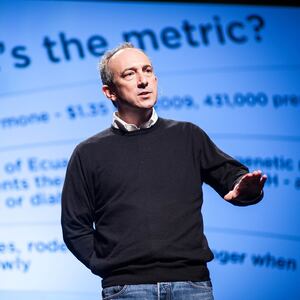Pay Dirt is a weekly foray into the pigpen of political funding. Subscribe here to get it in your inbox every Thursday.
Right-wing Florida Republican congressional candidate Anthony Sabatini is not afraid to trumpet his resume, including his undergraduate degree from the University of Florida, where—according to his LinkedIn, Legistorm, Wikipedia, law firm, and Timeshare Information Center bios—he graduated with honors, magna cum laude.
But Sabatini’s honors thesis—a 2012 treatise on the political legacy of German philosopher Friedrich Nietzsche, titled “A Profound Logic of The Blood”—is wildly plagiarized.
ADVERTISEMENT
The Daily Beast’s review of the paper found that Sabatini lifted an astonishing amount of content verbatim from other sources. Worse, Sabatini—who double-majored in history and philosophy before being admitted to law school, also at the University of Florida—frequently pulls his passages from Wikipedia, and presents them without the required quotation marks or any clear attribution whatsoever.
In some instances, Sabatini injected slightly different words here and there—ripples in the streams of the thoughts, ideas, and words of other people, which he arrogated as his own. And in places where Sabatini does reference a secondary source, those references themselves frequently appear to be incorrect and, often, according to a plagiarism expert, entirely made up.
In fact, the very first sentence is plagiarized.
“The twentieth century has seen countless appropriations of the ideas of the philosopher Freidrich [sic] Nietzsche for cultural and political ends, yet nowhere have these attempts been more frequent or important than in Germany,” Sabatini wrote at the outset of his thesis. (The honors student misspells “Friedrich” as “Freidrich” throughout the paper.)
A near-verbatim version of that same sentence first appeared 20 years earlier. “The twentieth century has seen countless attempts to appropriate the ideas of Friedrich Nietzsche for diverse cultural and political ends, but nowhere have these efforts been more sustained and of greater consequence than in Germany,” according to an abstract for an academic book from the University of California Press titled, “The Nietzsche Legacy in Germany, 1890-1990” (Aschheim, 1992).
Sabatini actually properly cites a block quote from that same book on the very next page, though he gets the original publication date wrong. (He also somehow still misspells “Friedrich.”)
However, it’s possible that Sabatini never even opened that book. That block quote—which wasn’t written by the author, Aschheim, but was a quote Aschheim had attributed—appears on a Wikipedia page, attributed to Aschheim’s book, added in June 2006.
In another example pulled at random, Sabatini lifts from another old Wikipedia entry about Nietzsche’s conflicted torchbearer, Martin Heidegger. That passage—which has been widely cited across the internet—comprises a stretch of totally uncited writing so long that it’s almost courageous. It’s so extensive, in fact, that it would be unwieldy to reprint in full. Here are the first few sentences, however.
Sabatini: “Two important and recurring themes of Heidegger’s writings that have been influential in the period are poetry and technology. Heidegger sees poetry and technology as two contrasting ways of ‘revealing.’ Poetry reveals Being in the way in which, if it is genuine, it ‘commences’ something new. Technology, on the other hand, when it gets going, inaugurates the world of the dichotomous subject and object, which modern philosophy commencing with Descartes also reveals.”
Wikipedia: “Two recurring themes of Heidegger's later writings are poetry and technology. Heidegger sees poetry and technology as two contrasting ways of ‘revealing.’ Poetry reveals being in the way in which, if it is genuine poetry, it commences something new. Technology, on the other hand, when it gets going, inaugurates the world of the dichotomous subject and object, which modern philosophy commencing with Descartes also reveals.”
Sabatini continues this for another 70 words, across three sentences. (One exception: For one quoted phrase, Wikipedia includes an in-line citation; the thesis does not cite the source.)
Mark Algee-Hewitt, director of graduate studies and associate professor of digital humanities in the Stanford University English department, said it was “a fascinating text from a plagiarism standpoint.”
“The more that I look into it, the stranger it seems to get,” Algee-Hewitt told The Daily Beast.
After a statistical and stylometric analysis, including automated database searches, Algee-Hewitt concluded that Sabatini had committed “egregious” acts of verbatim plagiarism. He also made a point to note that “the frequent misspellings in Sabatini’s text make matching these harder than it should.” As for the paper’s altered phrases, he said, the odds those occurred by chance are “one in quadrillions, if not more.”
But the expert found something even more stunning: Sabatini also appears to have lied about his sources.
“Many of the references to his secondary sources seem largely fabricated, right down to the page numbers,” he said.
As for academic consequences, Algee-Hewitt said that the most charitable interpretation of “overenthusiastic paraphrase” could only apply to “a few of these instances.” Even then, he said, the thesis would “still earn an F in most classrooms,” though he was quick to add that “there are even more instances where sentences, and paragraphs, are taken from unacknowledged, mostly online, sources and inserted directly into the text.”
Sabatini didn’t return a request for comment.
It bears emphasizing that, had Sabatini been caught, it would have changed the course of his entire life. Most college students would not only have received an F for their capstone work; they would likely be thrown out of school. Sabatini would not have graduated—let alone with honors—and would not have been accepted into law school. He would not have become a lawyer, would not have become a Claremont Institute honoree, and would not have been able to parlay his legal work into a career in right-wing loudmouth politics. He would have doubtlessly led an entirely different existence.
As it stands, however, Sabatini is taking his second whack at federal office. After losing to Rep. Cory Mills in the 2022 GOP congressional primary, Sabatini has raised more than $200,000 to fuel his 2024 “America First” primary bid in another district—this time against incumbent Rep. Daniel Webster (R-FL).
There are simply too many of these plagiarized passages to cover in full. A small sampling demonstrates the sheer audacity of Sabatini’s con.
Sabatini: “The ‘reactionary modernists’ formed a coherent group in that they used the same set of metaphors, familiar words, and emotionally laden expressions that had the effect of converting technology from a component of alien, Western Zivilization into a part of ‘organic’ German Kultur.”
Page one of Jeffrey Herf’s “Reactionary Modernism: Technology, Culture, and Politics in Weimar and the Third Reich”: “But this tradition consisted of a coherent and meaningful set of metaphors, familiar words, and emotionally laden expressions that had the effect of converting technology from a component of alien, Western Zivilization into an organic part of German Kultur.”
While Sabatini does include a footnote citing Herf, he does not put Herf’s phrase in quotation marks, as mandated by the Chicago citation style used for the thesis. (The same phrase is properly quoted in a graduate thesis submitted at the University of Tennessee, Knoxville the year before.)
Many of the phrases Sabatini lifts bear the type of nearly imperceptible differences contained in the example above—a puerile trick that students and teachers around the country may recognize.
However, Sabatini also demonstrates that he does, in fact, know how to properly cite a direct quote. He does so in a conspicuous place—the quote from which he takes the piece’s title. Here’s how he chose to handle that:
Junger took the experience of war to be a transcendental and stated prophetically that the future of political commitment would be changed entirely from the fire of war: “Now our actions must be guided by quite different forces, very dark forces of the blood, but one senses that the blood possesses a profound logic.”82
But in other places, Sabatini is remarkably cavalier.
For instance, when introducing Nietzsche’s conflicted torchbearer, Martin Heidegger, Sabatini appears to rip a sentence straight out of the Stanford Encyclopedia of Philosophy without quoting or even citing the source.
Sabatini: “Martin Heidegger was born in Messkirch, Germany, on September 26, 1889. Messkirch was then a quiet, conservative, religious rural town, and as such was a formative influence on Heidegger and his philosophical thought.”
Stanford: “Martin Heidegger was born in Messkirch, Germany, on September 26, 1889. Messkirch was then a quiet, conservative, religious rural town, and as such was a formative influence on Heidegger and his philosophical thought.” (Archived in 2012.)
Stanford University is at least an academically acceptable source. Sabatini far more often seems to pull from Wikipedia.
Algee-Hewitt—the Stanford expert—told The Daily Beast that one Sabatini passage was not only “lifted just about wholesale” from the Wikipedia entry about a book Sabatini purports to analyze, he cites an apparently fake source.
“What’s odd is that Sabatini cites Fritz Stern’s ‘The Politics of Cultural Despair’ (page 185) as the source for the quotation,” Algee-Hewitt said. That sentence, however, “doesn’t seem to be in that book at all, let alone on page 185.”
“In fact, I haven’t been able to track down many of the quotations (except the epigrams from Nietzsche) that he cites in the text,” he said. “I’ve found the relevant books and pages, but a lot of them just aren’t there.”
Wikipedia could explain the mystery. A Wikipedia entry cites two books, including Stern’s, and an archived page from 2011 only cites Stern. However, the citation isn’t associated with any particular text, and does not include a page number.
Asked about UF’s plagiarism and citation policies, University of Florida vice president of strategic communications and marketing Steve Orlando said that he could not answer for the guidance Sabatini received 11 years ago, but provided a link to the school’s current guidelines. He also noted that “citation standards vary from department to department and even from adviser to adviser.”
(Sabatini’s adviser, Peter Bergmann, died in 2017. When he signed off on Sabatini’s thesis, he was 70. For some reason, Sabatini’s bibliography includes a book by Bergmann, though it is never used in his paper.)
Asked whether the university plans to review Sabatini’s thesis, Orlando replied, “I can’t speak to that because of student confidentiality.”
The school’s new president, former Sen. Ben Sasse (R-NE), has been a recent target of Sabatini. Following Sasse’s appointment last October—which Sabatini called “a TERRIBLE decision”—the Florida man labeled the leader of his alma mater a “traitor.”
“This traitor should NEVER have been appointed to a position of power in Florida—shows you that Jeb Bush is still calling many of the shots down here,” Sabatini tweeted, alongside a photo of Sasse doing the “Gator Chomp” in front of the university seal.
Of course, as Algee-Hewitt of Stanford pointed out, it doesn’t take an honors degree to see that Sabatini appears to have violated the fundamental rules of citation, which most students in the United States learn by the time they enter high school.
Still, in the interest of showing our work, here is what the University of Florida has previously said on the matter.
A spot-check of UF undergraduate honors theses from the same year, 2012, reveals consistent use of quoted phrases and unambiguous attributions—including one that also discusses Nietzsche and Heidegger. A sample Chicago style paper available on the UF library’s reference page also demonstrates quotation marks for phrases pulled directly from sources. A presentation PDF titled “How to Avoid Plagiarism” provides fulsome background that covers Sabatini’s various infringements, and even includes a quote from former UF professor James Twitchell, who resigned in 2009 after admitting he had “cheated by using pieces of descriptions written by others.”
“It’s my responsibility to make sure that the words and ideas are my own and, if not, that they are properly credited,” Twitchell said at the time, adding, “I have used the words of others and not properly attributed them.”
A few months before Twitchell stepped down, the university publicly acknowledged that plagiarism was “such a growing trend among UF students” in the digital era that the school was taking new steps to crack down, the Gainesville Sun reported at the time.
That 2008 report also noted that the university’s Student Honor Code “defines plagiarism as quoting oral or written materials without proper attribution and submitting an assignment which in whole or in part is identical or substantially identical to a document not authored by the student.”
That report was published in the first weeks of Sabatini’s freshman year.
A UF Law spokesperson didn’t respond to a request for comment.
The content of Sabatini’s undergraduate thesis does have a direct, albeit inverse, relationship to his political aspirations today, specifically through the MAGAfied lens he now purports to see the world.
To that end, Sabatini appears to have personally engineered his thesis’s conclusion—at least some of it.
His conclusion is that these early 20th-century German conservative trailblazers—whom many academics blame for providing the intellectual scaffolding that Nazis later co-opted—“were unaware of the contradiction between the logic of conservatism and the approach they began to take.”
“The arguments put forward by the conservative revolutionaries showed blindness to towards [sic] the true nature of the Nazis,” wrote Sabatini. “Moreover,” he concluded, “the dilemma and failure of working out a ‘conservative revolutionary’ program has been studied and should be understood in comparing the group to the Nazis.”
Well, that part appears to have been taken straight from the Wikipedia entry for “Conservative Revolution.”
Today, however, Sabatini—who has been called the “worst person in the Florida legislature”—self-identifies as a conservative revolutionary. He has pushed radical and unpopular culture war policies that, among other things, call for defunding academic institutions.
In December 2021, the then-Florida state representative tweeted, “Bulldoze every university and replace them with replicas of Hillsdale College,” a reference to a highly conservative Christian college in Michigan. In August 2021, he posted, “Defund the universities ASAP.” But as of 2020, Sabatini was one of two GOP state legislators who reported carrying more than $100,000 in student loan debt, with $138,403; this year his financial disclosure shows he still owes between $100,000 and $250,000 from law school.
In a 2020 podcast, however, Sabatini fondly revisited his early academic promise as a high school sophomore. According to Sabatini, his principal at the time told him, “You have some potential and you’re going to be one of two things, either you’re going to end up in the United States Senate, or you’re going to end up in prison. And you have to make that choice.”
“No one had ever talked to me that way before,” Sabatini said.











